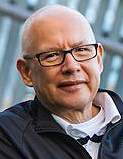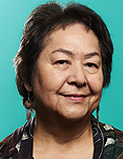Aboriginal Education Research Forum 2021
Keynote Speakers

David Newhouse
David Newhouse is Onondaga from the Six Nations of the Grand River community near Brantford, Ontario. He is Professor of Indigenous Studies at Trent University in the Chanie Wenjack School for Indigenous Studies and Professor of Business Administration in the School of Business Administration. He has been Chair of the Department of Indigenous Studies, now the Chanie Wenjack School for Indigenous Studies, since 1993.
His research interests focus on the emergence of modern Indigenous society, focusing on emerging Indigenous communities. He teaches 1600 students per year in two first year courses in Indigenous Studies as well as a fourth-year business course, thinking about Management, grounded in Indigenous Knowledge.
He was awarded the Trent University Teaching Award for Educational Leadership and Innovation in 2016. He has served for the last decade on the Executive Committee for the Trent University Faculty Association: three years as president. He currently serves as grievance officer. He is the Chair of the Aboriginal Working Group of the Canadian Association of University Teachers. Locally, he serves on the board of directors for the Nogojawong Friendship Centre in Peterborough and the Co-Chair of the Trent Indigenous Education Council. He lives in Peterborough in the 1818 Treaty 20 territory on land granted by the Crown to land speculator Zaccheus Burnham in 1830.

Dr. Laara Fitznor
Dr. Laara Fitznor is originally from Wabowden, Manitoba who is also a member of Nisichawaysihk Cree Nation. She retired from the University of Manitoba where she taught Indigenous Education, Indigenous Perspectives in Philosophy of Education and Educational Thought, and Cross Cultural Education in the Faculty of Education from 2003 to December 2018. Previously, she worked for the Access programs (as Counsellor and Director) from 1982 to 1992 and the Faculty of Education from 1992 to 2003. She also taught and began the work of Indigenous specialization in education at the Ontario Institute for Studies of Education, University of Toronto from 1998-2003. Over the 36-year span of her academic years in advancing Indigenous knowledges and perspectives in education, she has incorporated Indigenous knowledges/practices, decolonizing and bridging pedagogies into her work where people learn to challenge past wrongs, coexist and collaborate in a way of transformative possibilities toward relevance, respect, reciprocity and responsibility. Laara has served on many boards, councils and graduate thesis committees locally, nationally and internationally. The purpose for these committees was to advance Indigenous perspectives and knowledges. For the past 15 years, Laara has served as Co-chair of the Aboriginal Education Research Forum ‘Shawane Dagosiwin’ program committee. Her passion for learning and teaching will continue into her retirement life where there is desire to make changes toward Indigenous inclusion and advancement.
Laara has been an avid presenter and keynoter for many conferences both in Canada and abroad. She has supervised Manitoba Indigenous students whose thesis can be found at the University of Manitoba Libraries such as Marlene Gallagher, M.Ed.; Helen Settee, M.Ed.; Myra Laramee, PhD; Colleen West, M.Ed.; and served on the graduate committees of many other graduate students. Laara's academic publications include: doctoral thesis Aboriginal Educator's Stories: Rekindling Aboriginal Worldviews; and book chapters that includes 1). The Circle of Life: Affirming Aboriginal Philosophies in Everyday Living; 2). The Power of Indigenous Knowledge: Naming and Identity and Colonization in Canada, and Indigenous Scholars; 3). Writing through Narratives and Storying for Healing and Bridging (this chapter is published in a book co-edited by Dr. Laara Fitznor and Dr. Joy Hendry titled ‘Anthropologists, Indigenous Scholars and the Research Endeavour); 4). With Gallagher, M. (2016) “Culturally Responsive and Innovative Student Support Programs CAN overcome Issues of Poverty and Poor Educational Outcomes for Indigenous Students”; and 5). Fitznor, L. (2019). Indigenous Education: Affirming Indigenous Knowledges and Languages from a Turtle Island Indigenous Scholar's Perspective: Pikiskéwinan (Let us Voice), in (Coppélie Cocq & Kirk P.H. Sullivan, Editors). Perspectives on Indigenous Writing and Literacies. Series: Studies in Writing, Volume 37. Brill Publishing. https://brill.com/view/title/31954
Laara believes that those of us in the field of Indigenous education CAN respond to the need for engaging Indigenous knowledges through deep philosophical approaches and deep self-knowledge about our roles in society. Taking a conscientious leap of knowing ourselves with our multiple nodes of identities is an important part of understanding Indigenous education. Our willingness to examine ourselves places visions and dreams into our hands for bridging realities and enacting reconciliatory efforts.
